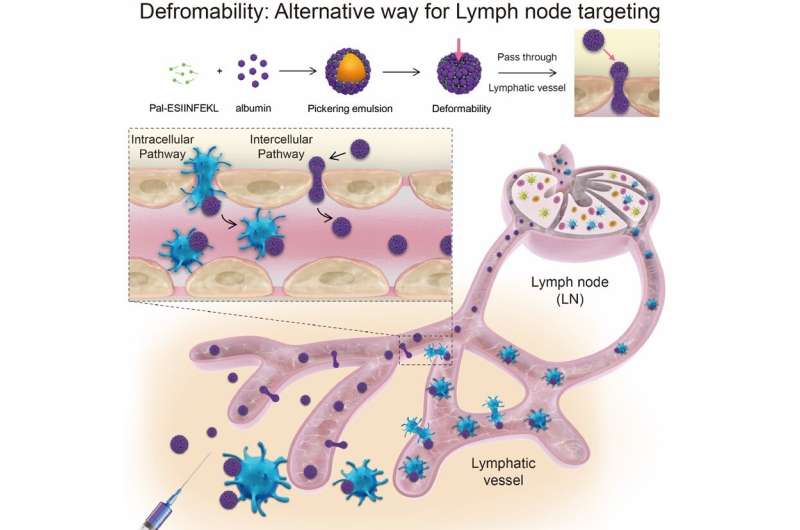
Albumin-stabilized emulsion deformation enhances lymph node homing. Credit: IPE
Researchers from the Institute of Process Engineering (IPE) of the Chinese Academy of Sciences developed deformable albumin-stabilized emulsions that could improve lymph node delivery efficiency and immune response effect, providing a new strategy for the enrichment of vaccines to lymph nodes.
The study was published in Advanced Materials.
One of the challenges in vaccine delivery is to achieve lymph-node (LN) accumulation, which can utilize concentrated immunocytes and cytokines in LNs to stimulate the onset and persistence of adaptive immune responses.
The development of vaccine delivery systems has been focused on the sizes, charges, and surface ligands, not on their deformability. In fact, the LN homing of antigen-presenting cells depends on deformability to pass through the cellular gaps.
The researchers developed deformable albumin-stabilized emulsions. Due to their mechanical-sensing deformability, droplets (330 nanometers in size) can attach to and deform between cells, allowing them to pass through endothelial spaces (20-100 nanometers) and penetrate lymph nodes.
With this biomimetic process, the albumin-stabilized emulsion can be efficiently enriched to the lymph nodes after intramuscular administration. "Some of the emulsion can be retained at administration sites for potent antigen uptake and activation of APCs as well as targeted delivery of vaccines through LNs," said Prof. XIA Yufei, one corresponding author of the study.
Compared with solid particles, the dual LN transfer strategy could enhance antigen accumulation, stimulate LN drainage and cellular immune responses, and improve survival of tumor-bearing mice. "Albumin-stabilized droplets may be used to enhance LN targeting and vaccination-enhancing effects," said Prof. MA Guanghui, the leader of the research group.
 Search
Search




 京公网安备110402500047号
京公网安备110402500047号